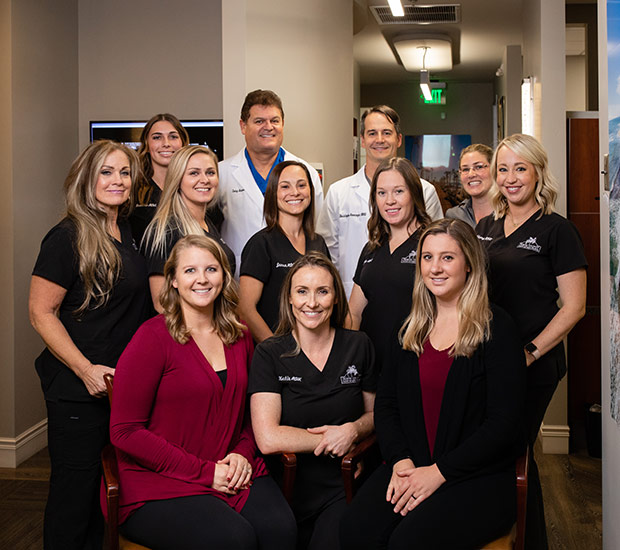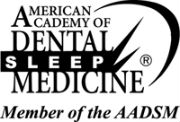Dentures and Partial Dentures Vista, CA
You have probably heard about partial and full dentures as treatments for tooth loss. If you are now facing this problem and want to do something about your smile, these are great solutions. Living with missing teeth can make things difficult for eating, but it can also affect your self-esteem. Dentures and partial dentures are practical solutions to restore mouth function and help patients enjoy smiling once again.
Dentures and partial dentures are available at North County Cosmetic and Implant Dentistry in Vista and the surrounding area. Our team can evaluate your condition and determine which option is the right fit for you. Whether you are missing a few teeth, several teeth, or all your teeth, dentures may provide the relief you have been anticipating. Because our professionals have the necessary knowledge and training, you can feel at ease knowing we can set you on the path to a beautiful smile.
Call our office today at (760) 940-2273 so you can make an appointment.
Dentures Can Help Prevent Further Oral Health Issues
The purpose of dental care and oral hygiene is to prevent tooth loss as much as possible. However, there are cases in which tooth loss is unavoidable. When an infection advances to later stages or begins to spread, tooth extraction may become the only option. If a tooth falls out on its own or is knocked out, there is a chance the empty socket can cause the other teeth to begin to shift.
The doctor can help restore missing teeth with dentures or partial dentures. By ensuring there are no more traces of infection in the mouth, dentures can help to prevent the spread of further contamination to the mouth or jaw. Even with dentures, patients will want to continue an oral hygiene routine that involves keeping the gums and mouth clean.
With partial dentures or at least several natural teeth still in the mouth, it is essential to keep up regular oral hygiene methods, including:
- Daily brushing. As soon as teeth emerge in a child’s mouth, it is vital to brush regularly. It is wise to brush at least twice daily through one’s entire life.
- Consistent flossing. Daily flossing will remove food from between teeth. Doing this will keep bacteria from growing on the gums and beneath the teeth.
- Regular visits to the dentist. Patients should visit our dental team at least once every six months. More frequent visits may be necessary for restorative care.
Other Benefits
While dentures and partial dentures may not be for everyone, they can help people experience the satisfaction of a full smile and eating favorite foods again. Dentures closely resemble natural teeth. We will make sure the artificial teeth match the color of any remaining real teeth. Dentures can also give a person’s cheeks a more defined shape and appearance.
Check out what others are saying about our denture and partial denture services on Yelp: Dentures and Partial Dentures Vista
Choosing Dentures for Tooth Replacement
Dentures and partial dentures only represent one of the many options patients can choose from.
When to Get Dentures
Dentures become a viable option almost every time someone loses their teeth. Even the loss of one tooth can result in the use of partial dentures to rectify the problem. If a person decides to get implants or bridges, they may still wear dentures temporarily until this work is completed.
Note that young people lose their teeth too. One of the most common reasons for this is facial trauma, such as a sporting injury, motor vehicle accident, or a bad fall. These instances can lead to not just missing teeth, but also cracking and breaking.
In addition to this, young people may struggle with cavities. In fact, tooth decay affects people of all ages, especially those who love sugary foods and fizzy drinks. People with poor dental hygiene may also suffer more from caries than others.
Another effect of poor dental hygiene is gum disease, which is sometimes known as periodontal disease. This infection of the gums and the material surrounding the teeth may lead to complete tooth loss over time. People who smoke are more likely to suffer from gum disease than others.
Finally, there are several other health conditions and medications that may result in tooth loss. Diabetes, ectodermal dysplasia, rheumatoid arthritis, and gastrointestinal reflux may all increase the likelihood of tooth loss over time.
How Dentures Are Made
Some processes may differ depending on the materials used in making dentures, but it typically advances in the following sequence.
The process starts with taking an impression of the mouth. The dentist then creates a model using dental stone as a cast. The doctor may then ask the patient to try several different sets of sterilized dentures to determine the ideal fit as well as the preferred color and size of the teeth. After these selections, the dentist may then make some adjustments to the cast. Thereafter, it is sent to a dental laboratory for completion.
At the dental lab, technicians may then create a wax version of the gum line. These technicians make the replacement teeth from a material that closely resembles real teeth known as resin. Virtually all labs then seek approval from the patient and dentist before proceeding with the finishing touches.
Following approval, the technician removes the wax and replaces it with acrylic, which looks far more realistic. This process entails boiling to get rid of the wax, drilling holes in the teeth, and then injecting the acrylic. Finally, technicians clean up the teeth and polish the appliance. The entire process may require the patient to visit the dentist’s office four to five times.
Types of Dentures
When patient’s lookup types of dentures, they mostly come across full dentures and partial dentures. However, these are just the tip of the iceberg. Over the past few years, dentists created hybrids with other dental treatments to provide patients with even more options. You may contact one of our North County Cosmetic and Implant Dentistry team members to find out which denture is right for you.
1. Full Dentures
Most commonly used by seniors, these dentures replace a complete set of teeth. They sit directly on top of the gums. Some patients are good candidates for immediate placement. In this instance, the dentist places the previously made dentures immediately after the extraction of the teeth. For everyone else, the dentist may recommend waiting eight to 12 weeks after teeth removal.
2. Partial Dentures
When a patient still has teeth to blend in and anchor with the newly created teeth, the dentist may recommend partial dentures. This may require the use of a metal piece to which a pink-colored base is attached. The metal helps to anchor the false teeth to the natural teeth to prevent movement.
When a patient still has teeth to blend in and anchor with the newly created teeth, the dentist may recommend partial dentures. This may require the use of a metal piece to which a pink-colored base is attached. The metal helps to anchor the false teeth to the natural teeth to prevent movement.
3. Implant-Supported Dentures
This method blends dental implants with dentures. Instead of anchoring all the teeth in place individually, the dentist may add several dental implants that hold the full upper and/or lower set in place. Dentists may use this for partial dentures too. These dentures are not removable once in place. Please note that not all patients are good candidates for dental implants.
4. Overdentures or Snap-In Dentures
When patients prefer to retain the ability to remove dentures, but like the stability of implants, they may opt for overdentures. These are handy in instances where a person has no teeth, as the dental implants provide an anchor that the teeth can sit on. For even more excellent stability, patients may opt for snap-in dentures. In this case, the implants have locator receptors, and the dentures have attachments. These work together to snap the dentures into place for a snug fit.
Other Tooth Replacement Options
In addition to dentures and partial dentures, patients may want to consider other ways to replace missing teeth. When deciding which option to choose, there are a few factors to consider, such as cost, general dental health, and your lifestyle.
While implants are most likely to create the feeling of having a natural set of teeth, they are not always a feasible option. Cost is a top concern, especially when many or all teeth need replacement. According to WebMD, gum and bone health is important for successful implants.
Another option is an implant- or tooth-supported fixed bridge. This works similarly to the implant-supported denture but is not removable. Instead of clipping on to the teeth or implants, however, the bridge is affixed with cement or a screw. In addition to costing more than dentures, this option does not work with all configurations of missing teeth.
In the case of missing front teeth, dentists sometimes recommend a resin-bonded bridge. It is not very durable, which is why it is not used to replace other types of teeth that typically take more strain when chewing. It consists of a tooth replacement held on two wings that attach to the insides of the natural teeth on either side.
Helping Dentures Last With Proper Care
Dentures can work effectively for up to 10 years. This time frame will depend mainly on the person’s commitment and diligence to maintaining the appliance. Just as patients should brush and floss natural teeth, people must do the same with dentures. These habits will help prevent and remove stains from artificial teeth, helping to preserve the color.
Each night, patients should remove the dentures and soak the appliance in a solution that we recommend to help clean the dentures. After every meal, the wearer should take out the dentures and rinse them off. When doing this, the person must be careful not to drop the appliance. It may be helpful to place a towel on the counter or in the sink.
Dentures should allow the person to eat most foods without any issues. However, the patient should be careful about chewing hard items such as candy, nuts, and ice. Sticky foods can also pull the dentures out of the person’s mouth. If the person notices any damage to the base or artificial teeth, they should contact our office right away.
People should not try to fix the dentures without professional assistance. An article on the American Dental Association website offers more information on the subject of maintaining dentures and what to do if the break. In all cases of the dentures sustaining damage, it is crucial to call us for repairs.
Common Misconceptions About Dentures
At North County Cosmetic and Implant Dentistry, we hear a lot of myths about dentures. In some cases, people have inaccurate information about this treatment. We make sure every step of the procedure is explained in detail, and we are always willing to answer any questions our patients may have.
Myth: Dentures are only for older adults
Some people may think dentures and partial dentures are only for older patients. In actuality, many patients in their twenties and thirties wear dentures too. An independent marketing data firm called Servata found that 53% of denture wearers were at or under 44 years of age based on an online survey of 500 U.S. adults. While younger patients may be more frequent wearers of partial dentures, older patients are indeed more likely to be wearers of a complete set.
Myth: Dentures last forever
There is a misconception that once a patient has dentures, it is not necessary to schedule future appointments with the dentist. You still must go to the dentist twice a year for routine checkups. Dentures may also loosen, requiring a dentist to be readjusted. These consultations are crucial for identifying other oral issues, such as gum conditions.
Myth: Dentures feel uncomfortable
While it is true that dentures will take some time to grow accustomed to, most people feel comfortable with the appliance within a few weeks or even days. We can help resolve any concerns people have about the way the dentures fit or function.
Questions Answered on This Page
Q. Are there different types of dentures?
Q. Are there dentures to replace a few of my teeth?
Q. What are the benefits of dentures?
People Also Ask
Q. How do I take care of my dentures?
Q. What do I do if I damage my dentures?
Q. What do I need to know about making adjustments to my dentures?
Definition of Denture Terminology
- Alveolar Bone
- The alveolar bone is the bone surrounding the root of the tooth that keeps the tooth in place.
- Clasp
- A clasp is a device that holds a removable partial denture prosthesis to the teeth.
- Denture Base
- The denture base is the part of the denture that connects the artificial teeth with the soft tissue of the gums.
- Edentulous
- Edentulous is a term that applies to people who do not have any teeth.
- Periodontal Disease
- Periodontal disease is a condition that causes inflammation of the gingival tissues and membrane of the teeth, leading to tooth loss without professional treatment.
- Pontic
- Pontic is another term for an artificial tooth on a fixed partial denture.
- Rebase
- Rebase is the process of refitting denture prosthesis by replacing the base material.
- Reline
- Reline is when a professional resurfaces the surface of the prosthesis with a new base material.
- Resin/Acrylic
- Resin and Acrylic are resinous materials that can be components in a denture base.
- Stomatitis
- Stomatitis is the inflammation of the tissue that is underlying a denture that does not fit properly. It can also result from other oral health factors.
Back to top of Artificial Teeth









